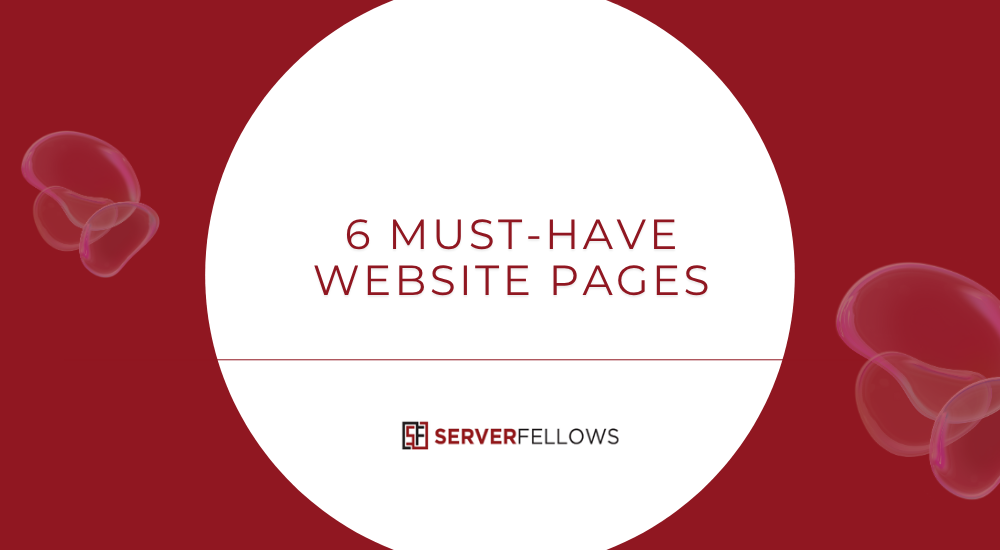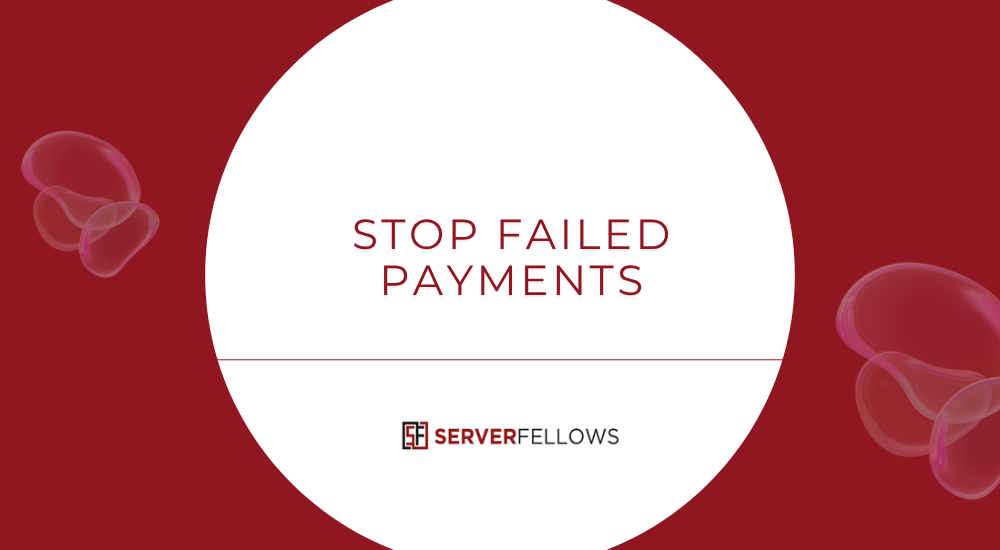
Pages Every Website Needs: Build Trust, Clarity, and Conversions
When visitors land on your website, they’re not just browsing — they’re deciding whether they can trust you. Having the right pages in place is one of the simplest yet most overlooked ways to build that trust and turn casual visitors into loyal customers. Whether you’re running an e-commerce shop, a service-based business, or a blog, there are certain pages every website needs to look credible, comply with regulations, and drive meaningful action.
If you’re setting up a new website or auditing an existing one, start with these six core pages: Privacy Policy, Terms of Use, Disclosure, FAQs, Testimonials, and Service Detail pages. Together, they form the foundation of trust and transparency.
To make setup effortless, you can use reliable hosting and easy website management tools from Serverfellows.com, which simplify adding and updating these essential pages.
Why These Pages Matter
Search engines reward websites that demonstrate transparency, authority, and user-friendliness. Visitors, too, want to know who they’re dealing with, how their data is handled, and whether they can rely on your claims.
By including the Pages Every Website Needs, you signal credibility both to search engines and potential customers. The right structure also ensures compliance with privacy laws and reduces customer support load. Let’s explore each must-have page in depth.
1. Privacy Policy
A Privacy Policy isn’t just legal text; it’s a cornerstone of digital trust. Even if you collect nothing more than names and emails, or use cookies for analytics, you’re responsible for telling users how their information is collected, stored, and used.
Your Privacy Policy should clearly outline:
- What information you collect and why.
- How long data is stored and how it’s protected.
- If and when data is shared with third parties.
- How users can opt out or request deletion.
Transparency here directly impacts credibility. Keep your policy visible — link it in the footer, contact page, and checkout pages. Update it periodically as your site evolves or when you add new tools like analytics or ad integrations.
You can host this page easily through your CMS or use managed hosting options at Serverfellows.com to automate security and compliance updates.
2. Terms of Use
Next on the list of Pages Every Website Needs are the Terms of Use (sometimes called Terms and Conditions). These set the legal groundwork for how your website and services operate. They clarify user eligibility, acceptable behavior, intellectual property, and liability — all while protecting your business from disputes.
Key elements to include:
- Eligibility and Access: Who can use your site and under what conditions.
- Billing and Payments: Payment structure, renewal rules, and refund terms.
- Content Ownership: Who owns user-generated content and brand assets.
- Disclaimers and Liability: Limit your responsibility for third-party content or downtime.
- Dispute Resolution: Explain how conflicts will be handled, ideally outside of court.
Avoid generic templates. A one-size-fits-all approach can create loopholes that cost you later. Instead, consult a legal professional or use a customized framework when publishing your Terms of Use page.
Once published, make it easy to find—usually in your website footer—and maintain version logs. With reliable hosting from Serverfellows.com, your updates stay live instantly and securely.
3. Disclosure Page
Trust is non-negotiable, especially if your website features reviews, sponsorships, or affiliate links. That’s where a Disclosure Page comes in — a transparent explanation of when and how you’re compensated for certain content.
Be honest about partnerships. Mention if a link earns you a commission, or if a post was sponsored. Visitors appreciate honesty, and regulations require it.
A few quick guidelines:
- Place disclosures near the relevant content (not buried in footnotes).
- Use plain, visible language like “I may earn a commission if you make a purchase.”
- Update disclosures whenever your affiliations or ad models change.
- Comply with FTC or other applicable guidelines for transparency.
Adding a clear Disclosure page shows integrity — and that’s something algorithms and audiences both reward.
For professional site owners, consider managing your affiliate and sponsorship pages through integrated tools or optimized hosting dashboards offered by Serverfellows.com.
4. Frequently Asked Questions (FAQ)
An FAQ page is one of the most effective ways to reduce repetitive inquiries and help visitors self-serve. It’s not just about convenience — FAQs also improve user experience, SEO, and conversion rates.
When structuring your FAQ:
- Start with data. Review customer chats, support emails, and search logs to identify common questions.
- Keep answers concise. Write in a conversational tone without jargon.
- Add schema markup. This helps search engines display FAQ results directly on search pages.
- Link internally. Point users to related pages for more details, like pricing or policies.
Example questions might include:
- “What payment methods do you accept?”
- “Do you offer refunds?”
- “How long does onboarding take?”
An optimized FAQ page reduces friction and boosts trust by addressing hesitations before they become objections.
If you’re hosting your site on Serverfellows.com, you can easily add expandable FAQ sections and structured data support to improve visibility and performance.
5. Testimonials
Few elements build trust as quickly as real customer testimonials. They serve as powerful social proof that your business delivers on its promises.
Collect authentic quotes that mention specific results or experiences. Include full names, job titles, and — when possible — photos. Rotate them regularly to keep the page fresh.
Consider featuring testimonials on:
- The homepage
- Checkout and pricing pages
- A dedicated “Customer Stories” or “Success” page
Here’s an example of how to format testimonials effectively:
| Customer | Result | Quote |
|---|---|---|
| Sam R. | 42% more leads | “Best decision this quarter.” |
| Priya K. | Faster onboarding | “Setup took minutes.” |
| Leo D. | Fewer refunds | “Support is stellar.” |
| Mia L. | Higher AOV | “Upsells finally convert.” |
| Chen W. | Time saved | “Automation just works.” |
By strategically placing testimonials across your site, you create micro-moments of reassurance that encourage visitors to act.
For small businesses and freelancers, platforms like Serverfellows.com offer site templates with built-in testimonial sections that are easy to update and customize.
6. Service Detail Pages
Your homepage might capture attention, but your Service Detail Pages seal the deal. These pages explain what you offer, how it works, and why visitors should choose you over competitors.
Each service deserves its own page. Doing this helps search engines understand your offerings and allows you to rank for multiple keywords.
A well-structured service page should include:
- Overview: What the service is and who it’s for.
- Benefits: Quantifiable outcomes and clear value propositions.
- Process: Outline the steps and timelines.
- Pricing: Transparent rates or at least a “Request a Quote” CTA.
- Proof: Include testimonials, results, and trust badges.
Use visuals such as comparison tables or diagrams to clarify tiers and deliverables. End each page with a clear CTA — for instance, “Get Started,” “Book a Consultation,” or “View Hosting Plans on Serverfellows.com.”
Make sure your Service Pages are not just informative but also conversion-oriented. Add internal links to FAQs and policies to reassure potential buyers before they commit.
Pro Tips for Optimizing the Pages Every Website Needs
- Keep Navigation Consistent: Users should be able to find these core pages from every part of your website — footer, header, or sidebar.
- Use Schema and Metadata: Privacy Policies, FAQs, and Service Pages can all benefit from structured data for better search visibility.
- Update Regularly: Outdated information can damage trust. Review policies and testimonials quarterly.
- Track Engagement: Use analytics to see which pages users visit before converting — this can guide where to add more detail or better CTAs.
- Prioritize Speed and Security: No matter how well-written your pages are, a slow or insecure site loses visitors. Managed WordPress hosting from Serverfellows.com ensures speed, uptime, and protection.
Conclusion
In the end, creating the Pages Every Website Needs isn’t about ticking boxes—it’s about building a digital space that feels professional, transparent, and trustworthy. A Privacy Policy safeguards users’ confidence, Terms of Use protect your business, and a Disclosure keeps everything honest. FAQs answer concerns instantly, Testimonials validate your claims, and Service Pages turn interest into action.
Start by auditing your current site and ensure each of these foundational pages exists, is up to date, and easy to navigate.
If you’re launching a new project or revamping your existing site, consider reliable hosting at Serverfellows.com to handle security, backups, and performance so you can focus on what matters — growing your online presence with integrity and confidence.
By focusing on these essential website pages, you’ll set the stage for a brand that users trust, search engines reward, and competitors respect.


